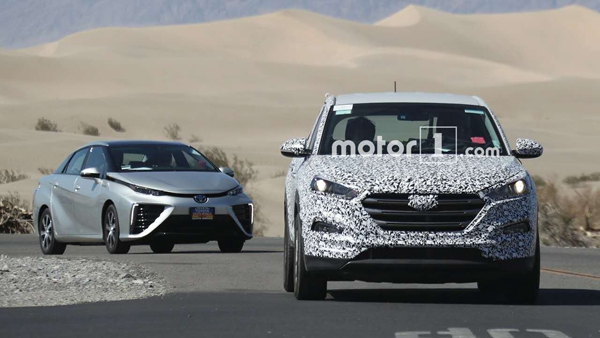
谍照记者最近设法拍到了现代基于途胜开发的下一代燃料电池车测试照片。目前这款车仍处于开发的早期阶段。在照片上可以看到丰田Mirai FCV紧随其后,这表明现代已经将其作为标杆。预计该车动力系统将是现行版基础上的改进版,将采用更先进技术和更强动力性。造型风格方面,虽然基于现行版途胜,但量产版将更接近现代在2014年日内瓦车展发布的Intrado概念车。现代计划于2018年冬季奥运会发布途胜燃料电池车,可它满足加州空气资源委员会制定的更严格排放法规。现行版现代燃料电池车基于途胜跨界车,搭载一台由现代和LG提供的295千瓦电池组,功率80千瓦/134马力,扭矩221磅-英尺(约合300牛米),百公里加速时间12.5秒,最高时速93英里(约合150公里),单次加注压缩液态氢燃料续航里程265英里(约合426公里)。
Hyundai's next fuel-cell electric vehicle spied while testing
Our talented spy photographer recently managed to snap some pictures of what looks to be a typical Hyundai Tucson-based test mule. But according to the information provided, it is anything but typical. Instead, the test mule seen in our gallery is described to be a prototype for Hyundai’s next-generation fuel-cell electric vehicle, or FCEV.
The Korean automaker is in the early stages of developing a new FCEV to succeed the current model. In several of the photos, a Toyota Mirai FCV can be seen shadowing the prototype in the pictures, indicating its use as a benchmark.
Specifics for the next car are scant. Speculation suggests we should expect an evolved version of the current FCEV’s powertrain. With the anticipation of advances in technology, more power wouldn’t be unreasonable to suspect, either.
Stylistically, despite being based on the current Tucson, the production variant will more closely resemble the Hyundai Intrado Concept. That concept car was first introduced at the 2014 Geneva Motor Show.
The Tucson FCEV is scheduled to launch at the 2018 Winter Olympics, while meeting stricter California Air Resources Board regulations. This ultimately means it can be sold in more states.
Today, Hyundai’s fuel-cell electric vehicle offering consists of a similar Tucson-based crossover and is only available through three select California-based Hyundai dealers. It is powered by a 295-kilowatt-hour battery pack co-developed by Hyundai and LG.
Output is rated at 80-kilowatts, or the equivalent of 134 horsepower and 221 pound-feet of torque. The resulting performance is a 0-62-miles-per-hour time of 12.5 seconds and a top speed of 93 mph. In optimal conditions, the present day FCEV can travel up to 265 miles on a full tank of compressed liquid hydrogen.